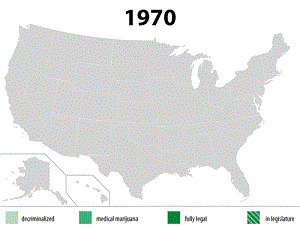 The United States seem to be rather quickly becoming a more comfortable place for cannabis users – the laws decriminalizing the possession and usage of recreational marijuana are being passed regularly. Delaware recently became the 18th state to pass legislation in this respect, and the situation will probably develop in the same fashion in the near future.
The United States seem to be rather quickly becoming a more comfortable place for cannabis users – the laws decriminalizing the possession and usage of recreational marijuana are being passed regularly. Delaware recently became the 18th state to pass legislation in this respect, and the situation will probably develop in the same fashion in the near future.
Although it doesn’t mean that complete legalization is to be expected soon, it is a big step in this direction. Nevertheless, prohibition on federal level is still in power, despite a prospective bill aimed at complete decriminalization of marijuana being in the works since 2013. If this bill is passed, marijuana will turn from an illegal or barely legal drug into a substance regulated in the same manner as alcohol. Other bills aim at allowing state governments to decide for themselves what their take on marijuana and its legalization should be.
So far there are 18 states that have already decriminalized possession of recreational marijuana (albeit in rather small dozes, and users still can be fined for smoking it in public places) and 23 (plus District of Columbia) that allow to use cannabis for medical reasons. Terms of legalization vary – in Washington, for example, one can freely smoke weed at home, grow up to six plants (again, at home) and have up to two ounces of the stuff in possession at any time.
However, if you live in a state that has already passed some kind of legalization law, you still should be wary – marijuana remains an illegal narcotic drug according to the United States federal law, thus occupying a legally gray area.
So, what lies in the future? It seems now that full legalization is only a matter of time. Not only an increasing number of Americans admit on smoking pot at one or another period of their lives – in 1969, the first time such a poll was carried out, only about 4 percent of those asked admitted to it. Today it is 44 percent.
That means that either the usage of marijuana in America is steadily on the rise, or the taboo on talking about it is becoming less prominent, or a mixture of both. It goes hand in hand with a record percentage of population being in favor of legalization, with 53 percent of Americans believing that ban on marijuana should be lifted. And not all of these 53 percent are smokers, with possible reasons for supporting legalization varying wildly. Some believe that it isn’t government’s business to allow or ban consumption of a seemingly harmless substance, some pay special attention to racial aspects of the matter, some concentrate on possible medical and social benefits of legalization. Legalization is supported by people often of diametrically opposite views on most other subjects.
This doesn’t, of course, mean that this support is universal. A large portion of the population is violently opposed to the idea – and how they are going to deal with it is a matter of the future.